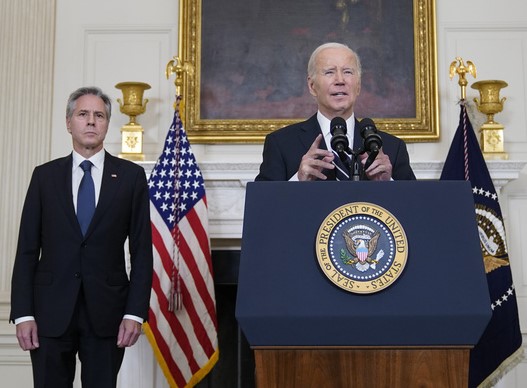The US Senate has approved a $95 Billion national security funding bill including new aid to Ukraine, but the legislation risks languishing in the House of Representatives because of opposition from Donald Trump.
The legislation includes $61 billion for Ukraine, $14 billion for Israel in its war against Hamas and $4.83 billion to support partners in the Indo-Pacific, including Taiwan, and deter aggression by China.
Further, it would also provide $9.15 billion in humanitarian assistance to civilians in Gaza and the West Bank, Ukraine and other conflict zones around the globe
The final vote on the bill in the Senate followed weeks of pressure from the Biden administration and a deepening rift among Republican senators on the merits of providing more assistance to Ukraine, alongside the broader question of America’s role in the world.
A total of 70 senators backed the legislation — which includes aid for Israel, Gaza and Taiwan — in its final vote early on Tuesday, while 29 opposed it.
Proponents of the aid package — including the White House, most Democrats and traditional Republicans — have argued that abandoning Ukraine could lead to Russian gains on the battlefield and embolden China to invade Taiwan.
US President Joe Biden on Tuesday released a statement urging the House, which is controlled by Republicans, “to move on this with urgency”.
Biden cannot enact the bill unless it passes both chambers of Congress.
“There are those who say American leadership and our alliances and partnerships with countries around the world do not matter. They do.
If we do not stand against tyrants who seek to conquer or carve up their neighbours’ territory, the consequences for America’s national security will be significant,” Biden said.
But Mike Johnson, the Speaker of the House who is close to Trump, poured cold water on the prospects for the bill on Monday night, saying the lower chamber would “work its own will” and “America deserves better than the Senate’s status quo”.
The stand-off on Capitol Hill has highlighted how Trump, the frontrunner for the Republican presidential nomination in this year’s presidential election, has tightened his grip on the party in the realm of foreign policy.
Last weekend, Trump suggested during a campaign rally in South Carolina that he would allow Russia to do “whatever the hell they want” to Nato allies if they failed to increase their defence spending.
This triggered a backlash within the transatlantic alliance, but most Republicans declined to criticise him.
Trump’s influence on the Republican party has extended to some lawmakers who are known to be national security hawks but are now hesitant about endorsing a large foreign security aid package.
Lindsey Graham, the South Carolina Republican senator, has instead embraced a proposal floated on social media by Trump to deliver loans instead of grants to its allies, including Ukraine.
“A loan on friendly terms allows America, who is deeply in debt, a chance to get our money back and changes the paradigm of how we help others.
President Trump is right to insist that we think outside the box,” Graham said.
Republicans have long insisted that senators include provisions to tighten immigration policy at the southern border with Mexico in any foreign aid package.
But after such a deal was negotiated, they balked at the compromise because it was opposed by the former president.
Senators then returned to the current version of the bill, which does not include any border measures.
JD Vance, the Republican senator from Ohio who has emerged as a leading critic of aid to Ukraine, gave a speech blasting the US foreign policy establishment for driving American military involvement in Vietnam and the Middle East over the past 60 years.
“Now, those experts have a new crusade. Now those experts have a new thing that American taxpayers must fund and must fund indefinitely. And it is called the conflict in Ukraine,” Vance said.
But the White House, many congressional Democrats and some remaining Republican proponents of Ukraine aid have been outraged by how the legislation has been stymied so far, and hope pressure will build on the House to pass the bill.
“I would hope to speak to Speaker Johnson directly, and my message is this is a rare moment where history is looking upon the United States and seeing if we will stand up for our values, stand up to bullies like Putin and do the right thing,” Chuck Schumer, the Senate majority leader, said on Tuesday.
“I will say to Speaker Johnson, I am confident that there’s a large majority in the House who will vote for this bill”.
Source: https://www.ft.com/content/809d1fe2-e72d-45a4-a6db-20407f2a9ac5





